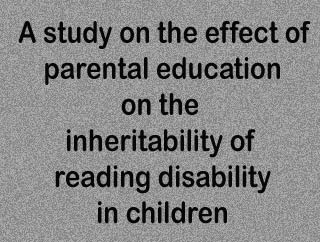
Psychologists have attempted to evaluate the potential link between genetic and environmental influences on reading disability and its relation to the level of parental education. Apparently, reading disability is the most commonly identified learning disability.
This study was conducted by psychologists at the University of Colorado, Boulder. The psychologists studied around more than 500 pairs of identical and fraternal twins. The educational levels of the twin’s parents were also observed. In these twins, apparently in each pair at least one of the twins had reading disability.
The psychologists stated that evidently there was a link between the level of parental education and the inheritability of reading disability. Apparently, children of the higher educated parents were more likely to have a greater genetic influence on reading disability as compared to the children of the lesser educated parents.
The researchers stated that apparently less reading practice could be one of the causes for reading disability in children coming from low socioeconomic status. However, evidently in children coming from high socioeconomic status, reading disability is often considered genetic.
Apparently, The No Child Left Behind Act of 2001 expects all the children, by 2014, to reach the “grade level†performance on reading and other academic skills. They evidently presume that this function will be performed with the aid of suitable education. It’s stated that this study may prove to be beneficial for future genetic research as well as national educational policies.
The study authors recommend that a better policy that would take into consideration the genetic hurdles of the reading disable children to accomplish the “grade level†performance. Also that, this new policy should appreciate the functionally critical progress the reading disable children make, in reading as well as other academic skills, even if they fail to reach the desired grade level.
Their findings were published in the Psychological Science, a journal of the Association for Psychological Science.
